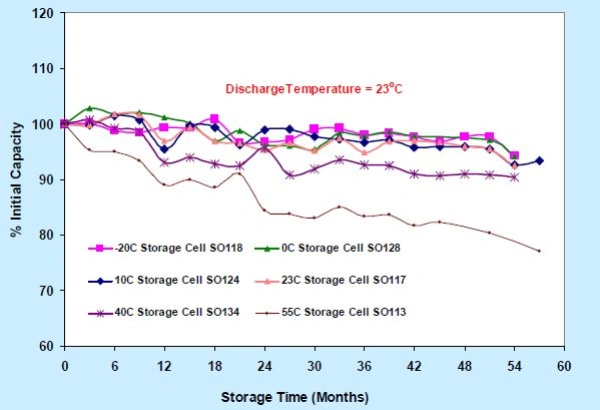Lithium batteries are used in more and more fields because of their large capacity and no memory effect.
If lithium batteries are improperly stored and maintained, they may be damaged or even cause fires, explosions and other accidents. So, how should lithium batteries be safely stored?
Part 1. Lithium battery storage warehouse
Warehouses storing lithium batteries should meet the following requirements.
1. Lithium batteries and lithium battery packs are dangerous goods. To ensure the safety of subsequent handling and transportation, all lithium batteries and lithium battery packs must pass the UN38.3 test.
2. Due to the characteristics of lithium batteries, the storage environment must be within 18-25°C. (The lithium battery testing environment must also maintain this temperature).
The higher the temperature, the faster the battery capacity decays.

When lithium battery cells are stored at room temperature or below, more than 90% of the remaining capacity can be obtained after 54 months.

3. Effectively control the humidity of the lithium battery warehouse. Avoid warehouses exposed to extreme humidity (relative humidity above 90% or below 40%) for long periods.
4. Lithium battery warehouses need to be physically separated by brick walls. Warehouses must use closed, explosion-proof, or other safety electrical lighting equipment.
5. Places storing flammable and explosive items should be equipped with sufficient variety and quantity firefighting equipment. And always in good condition. (Dry powder fire extinguisher must be equipped with a fire bucket filled with water for firefighting).
6. Where there are lithium batteries, fireworks, and smoking must be strictly prohibited.
7. Stacking flammable and explosive substances in the storage environment is strictly prohibited.
Part 2. Li-ion battery storage environment
- Lithium batteries should be stored in a well-ventilated, dry, or cool place. High temperature and high humidity damage lithium batteries and erode the surface of lithium batteries.
- Lithium battery cartons should not be stacked beyond the specified height. If too many cartons are stacked together, the lithium battery on the bottom layer may be deformed, and there is a risk of battery leakage.
- Batteries should be stored away from direct sunlight or rain. If the battery is exposed to water, the insulation resistance will decrease, and self-discharge and rust may occur.
- Do not stack batteries randomly, as this may cause short circuits or damage the battery.
- Items likely to cause combustion or explosion when in contact with each other and items with different fire extinguishing methods should be stored in isolation.
Part 3. How to safely transport lithium batteries?
- When handling lithium batteries, handle them properly to prevent materials from falling or being damaged.
- Issues such as load, stacking, and directionality should be considered when handling lithium batteries.
- When using a forklift or cart, the loading method should be heavy first and then light. Load and unload carefully to prevent damage to the lithium battery circuit.
Part 4. 10 best ways to store lithium batteries
- If the lithium battery is not used for a long time, it should be kept at a 50%-60% state of charge. A supplementary charge should be carried out every three months. It should be charged and discharged every six months.
- During transportation, lithium batteries should be protected from moisture and moisture. They should be protected from extrusion, collision, etc., to avoid battery damage.
- Do not use or place lithium batteries under high temperatures (in hot sunlight or in very hot cars). Otherwise, it may cause the battery to overheat, catch fire, malfunction, and shorten its life.
- Storing in places with strong static electricity and strong magnetic fields is prohibited. Otherwise, damaging the lithium battery safety protection device is easy, causing hidden dangers.
- If the battery emits a strange smell, generates heat, changes color, deforms, or appears abnormally abnormal during use, storage, or charging, immediately remove the battery from the device or charger and stop using it.
- The warehouse for storing lithium battery cells and lithium battery packs should be set up independently. The storage area should have a conspicuous “No Fireworks” sign. Piling up combustibles and flammable items around is strictly prohibited.
- Battery and cell warehouses should be equipped with video surveillance and smoke and temperature alarm devices. The alarm signal should be transmitted to a 24-hour manned location.
- Batteries and cells should be placed neatly. Do not stack them too high. Storage facilities should be made of non-combustible materials, and anti-static measures should be taken.
- The temperature of batteries and battery cell warehouses should be controlled within the range of 20±5℃. The maximum temperature shall not exceed 30℃, and the relative humidity shall not exceed 75%. Keep the warehouse clean, dry, well-ventilated,and free of other items.
- Discarded lithium batteries should be wrapped with insulating paper to wrap the electrodes. To prevent fire and explosion.
Part 5. How to deal with dangerous lithium batteries?
What should I do if the lithium battery gets hot?
Lithium batteries generate heat when charging and discharging (when in use). But the temperature is usually below 60 degrees. In the event of an internal or external short circuit in the lithium battery, the temperature will reach hundreds or even hundreds of degrees.
At this time, the lithium battery must be isolated and placed in the sand. Be careful not to touch the lithium battery directly with your hands; otherwise, you will be burned. Wait for the lithium battery temperature to drop to normal temperature before scrapping it.
What should I do if the lithium battery burns or explodes?
It is very dangerous if a lithium battery burns or explodes. People must stay away. Battery burning will not create an open flame. Under the premise of taking protective measures, if a single or very few lithium batteries burn or explode, they can be directly covered with sand. If a large fire area occurs, cool down with water first and then put out the fire with a dry powder fire extinguisher.
Part 6. Summary
Lithium batteries are widely used in various consumer electronic devices, including mobile phones, power supplies, new energy vehicles, etc. It has high hopes for its advantages such as high energy density, long life, small size, and lightweight. Because of its very active chemical properties, lithium metal’s processing, storage, and use have very high environmental requirements.
A slight carelessness (such as a short circuit, high temperature, extrusion and impact, overcharging, etc.) may cause the lithium battery to explode. Therefore, special attention should be paid to the manufacturing and storing lithium-ion batteries. During use and storage, relevant safety management methods and specifications for lithium batteries must be strictly followed.
Related Tags:
More Articles

Overview of Deep Cycle Lithium Battery
In this article, we explore the life, voltage, capacity, and charging considerations of deep cycle lithium batteries.
How Long do Lithium Batteries Last?
How long do lithium batteries last? we will explore the factors that influence the lifespan of lithium batteries and provide insights into their longevity.
How to Choose the Best LiFePO4 Battery?
Choose LiFePO4 batteries for superior performance, safety, and versatility in EVs, UPS, and backup power. This guide helps you make informed decisions.
Get 12v Lithium Car Battery As a Power Source for the Ride
Make the right choice for your vehicle's battery needs by installing a 12 volt lithium car battery. You will enjoy maintenance-free longevity with this change.
Everything About A Small Lithium Ion Battery
Discover the features, uses & future potential of a small lithium ion battery. A compact and tiny powerhouse ideal for smartphones, wearables, drones & more.





